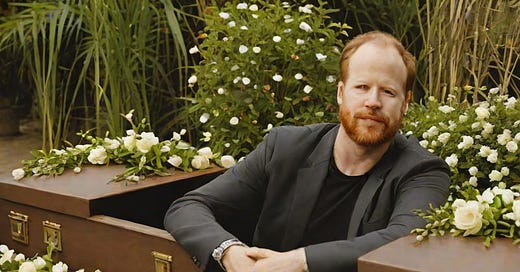The Loss of Joss Whedon
Even post-cancellation, we still live in the pop culture universe the screenwriter created.
Cheerleaders save the world. Vampires gain souls. Ellen Ripley comes back to life as a half-alien. In the case of Willow Rosenberg, Buffy the Vampire Slayer’s geeky, lesbian BFF, she’s a good witch one year, Southern California’s equivalent of the Wicked Witch of the West the next, and only a year later, the key to stopping an apocalypse. One season, you’re good; the next, you’re bad; then, finally, you’re the savior.
This is the world Joss Whedon envisions across six television shows (Buffy the Vampire Slayer, Angel, Firefly, Dollhouse, Marvel’s Agents of S.H.I.E.L.D. and The Nevers), dozens of comics (Buffy spin-offs, The Runaways and an acclaimed run on the Astonishing X-Men), and numerous films: Toy Story, Alien: Resurrection, Serenity, The Cabin in the Woods, Much Ado About Nothing, a bunch of uncredited rewrites of hits like Speed and, love it or hate it, the most influential blockbuster of this century, the movie that spawned dozens of superhero flicks: The Avengers. Whedon’s work varies from Disney cartoons to a supernatural teen soap opera to a Shakespeare adaptation, but across genres, he teaches audiences that a hero can become a villain, a villain can turn into a hero, and often, humans (or their vampire counterparts) are both good and bad.
So it was strange to see fans abandon the man-boy wonder when Whedon was accused of cheating on his wife with actors and verbally abusing his casts. The accusations were awful. Ray Fisher claimed Whedon altered his skin color in post-production for Justice League, and Charisma Carpenter alleged Whedon encouraged her to get an abortion when she got pregnant. When she refused, Whedon allegedly killed off her character, Cordelia, on Angel. Whedon acknowledged he’d slept with some of his actresses and was a dick, but denied Carpenter’s and Fisher’s specific allegations. He even half-apologized in a New York magazine profile.
Of course, no apology was ever enough for the nerd herd. “Off with his head,” his former fans declared. Their disavowal is tragic because Whedon not only created some of the most influential pop art of the past twenty-five years, but his work teaches nuance, which we could use more of in our polarized world.
Part of Whedon’s problems go back to his career-long public relations strategy. Whedon broke out in Hollywood as a script doctor, rewriting hits like Twister, then attempted to recreate his flop 1992 movie, Buffy the Vampire Slayer, as a TV show on the struggling WB network. The show departed from teen fluff in numerous ways: its premise inverted the horror trope of the dead teen girl, with Buffy slaying the vampires — as Whedon put it, a metaphor for “high school as a horror movie.” And, at least in public, a very feminist metaphor at that.





